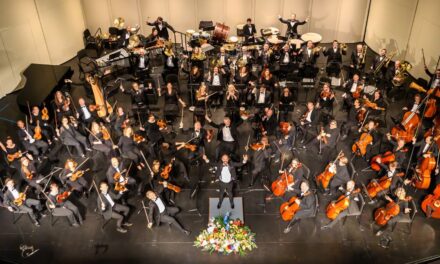Has the time for old-fashioned, vigorous and unabashedly patriotic celebration of the Fourth of July already come and gone? If so, no one seems to have told the personnel of the Raleigh Concert Band. Under the direction of Lem Hardy, these players rang out a total of ten selections, each one of them as if inspired by their director’s own surname.
These pieces formed a substantial part of the State Capitol Independence Day Celebration on the East Stage of the capitol grounds. Exceedingly agreeable climatic conditions on a gorgeous morning enhanced the already uplifting festivities.
You’d never guess what composer was prominent in these commemorative and time-honored band offerings. The musicians led off with Sousa’s “Washington Post March,” then straightway honored him again by launching into “The Liberty Bell March.” Later in the program they revisited Sousa with a rousing reading of “The Thunderer.” As the band negotiated “The Stars and Stripes Forever,” those of a certain age in the celebratory audience could readily discern the images of Clifton Webb and Debra Paget smiling down.
A crowd pleaser was the “Armed Forces Salute,” wherein each branch of the service was given its due. They saluted “The Old North State,” along with “The National Anthem” and the obligatory “God Bless America.”
Another group present would have been surprised to hear that patriotic Independence Day galas were out of fashion. The “Star Catchers” are a small troupe of special needs adults from Forsythe Technical Community College in Winston Salem. Under the leadership of faculty member Kris Jonczak and volunteer Paul Kindley, these students regularly perform elementary dance routines to recorded music selections. Here they honored the “Grand Old Flag” and looked forward to the time “When Johnnie Comes Marching Home.” And thinking of “America the Beautiful,” they claimed that “This Land is My Land.” It’s hard to imagine a more worthy endeavor than affording such an opportunity to these people.
A highlight of this celebration was the Independence Day Naturalization Ceremony, that aspect of the day to which all the music and the rituals were precursors. It is likely that no one there was as captivated and elated as the twenty-eight “new citizens” who swore the Oath of Allegiance, as administered by Lisa Wohlrab, an officer with the U.S. Citizenship and Immigration Services. Her “Call of Nations” revealed that these newly-minted Americans hailed originally from twenty-one different nations, representing quite literally every section of the globe.
So it was a fine experience musically and communally. The high-spirited crowd temporarily put aside all partisan rancor. As they filed away from the joyous grounds, they could, along with those twenty-eight brand new Americans, “…take this [citizenship] obligation freely without any mental reservation or purpose of evasion…”











